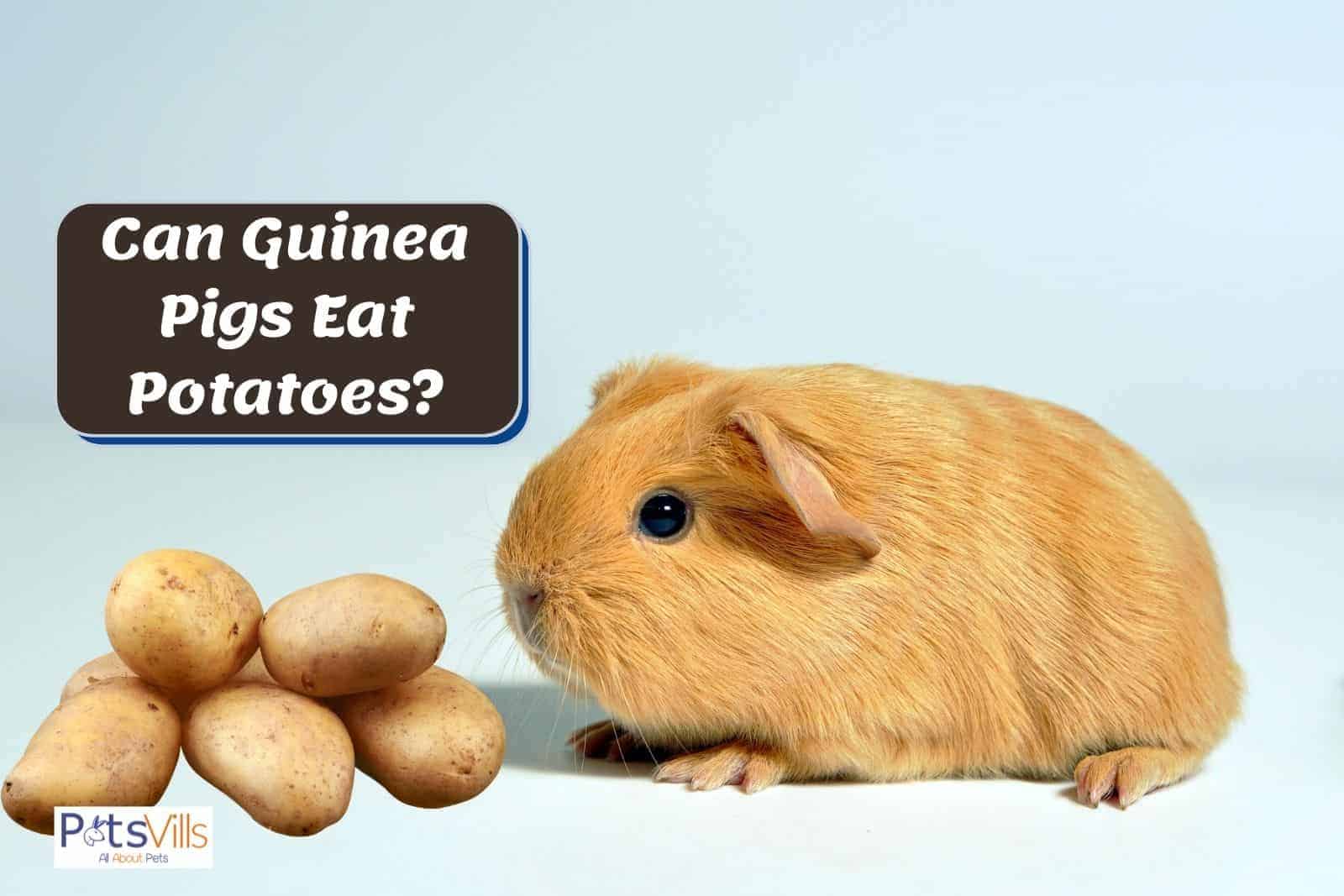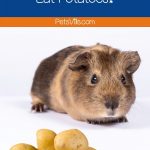Can guinea pigs eat potatoes?
Are they safe? What are the risks, and what should guinea pigs eat?
All these are questions a new or seasoned guinea pig owner may have.
Please keep reading to find out more about potatoes for guinea pigs and what are safe foods for guinea pigs.
Table of Contents
Can Guinea Pigs Eat Potatoes?
No, guinea pigs shouldn’t eat potatoes. Potatoes contain too many carbohydrates, and guinea pigs’ digestive systems can’t handle too high amounts of complex carbs.
Potatoes also contain alkaloids, which are toxic to guinea pigs and could lead to severe health issues.
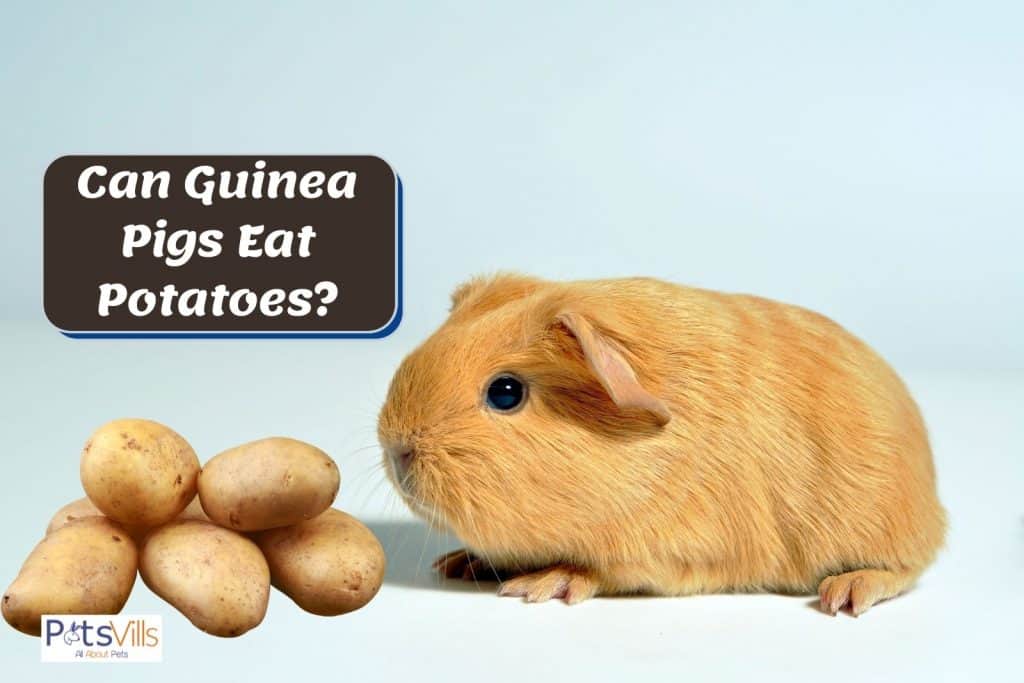
And lastly, potatoes contain high amounts of calcium, leading to bladder stones and urinary problems in guinea pigs.
Can Guinea Pigs Eat Potato Leaves?
No, cavies shouldn’t eat potato leaves. Potatoes belong to the nightshade family of plants that are known to contain a toxin known as solanine.
This toxin causes severe digestive problems, sore throats, inflammation, and diarrhea in guinea pigs.
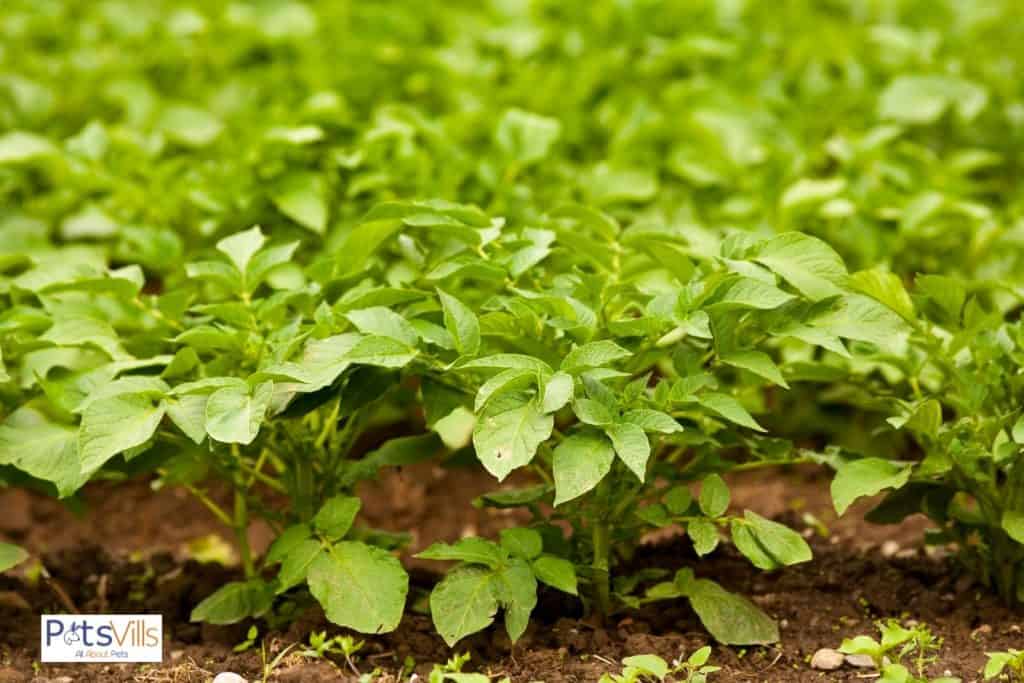
Can Guinea Pigs Eat Potato Chips?
No, guinea pigs shouldn’t eat potato chips. Potato chips are deep-fried and contain too much salt.
These ingredients are too complex for the guinea pig’s digestive system to digest, so avoid potato chips at all costs. The same case applies to French fries.
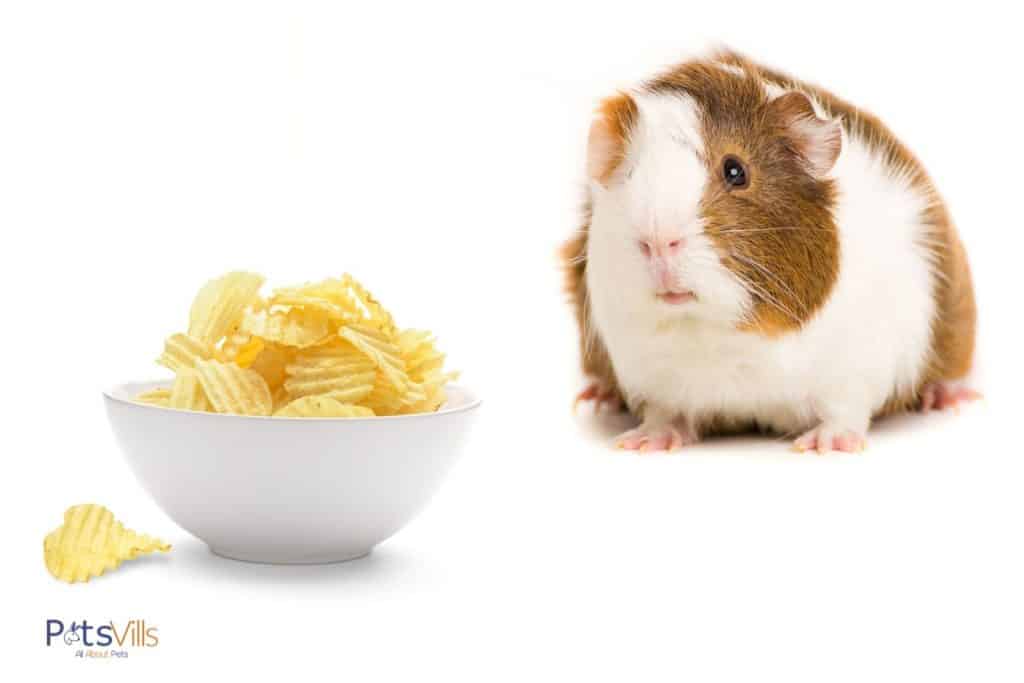
Can Guinea Pigs Eat Cooked Potato?
No, cooked potatoes are not safe for guinea pigs, even though they’re just boiled.
While cooking may neutralize some toxins, cooked potatoes still contain too many carbohydrates, which aren’t suitable for guinea pigs.
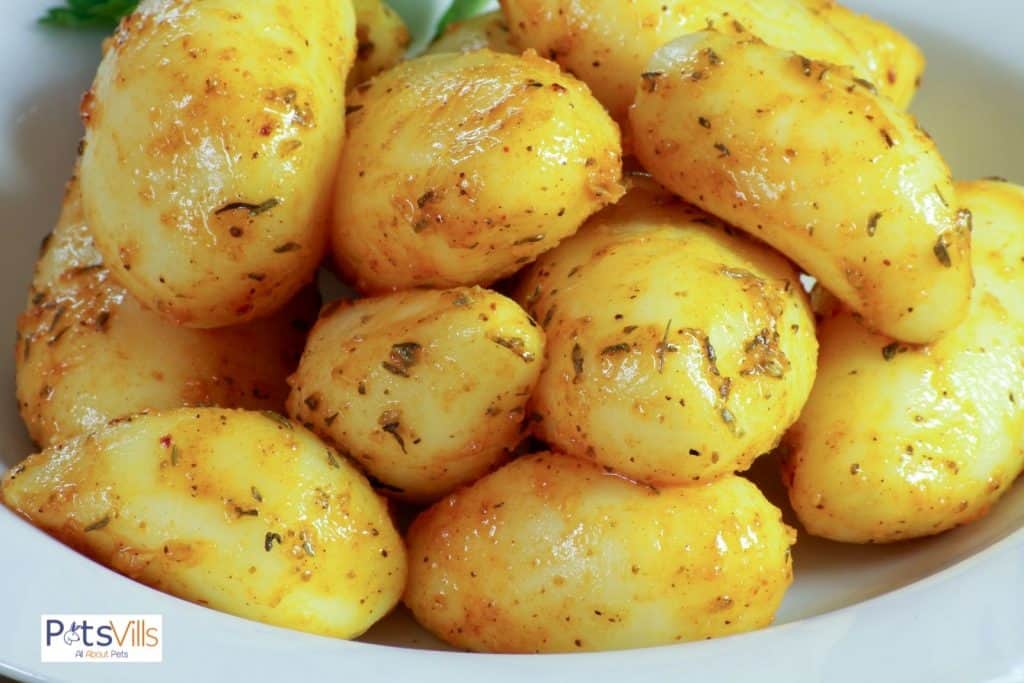
You should avoid feeding your guinea pigs any cooked food since they can’t digest it, and the additives involved in cooking may be toxic and could lead to severe digestive issues.
READ MORE: Can Guinea Pigs Eat Cucumbers?
Can Guinea Pigs Eat Potato Peelings?
No, they shouldn’t. While the peelings may be a good source of Vitamin C, minerals, and fiber, they are still toxic to guinea pigs, and they also contain excess starch.
The best source of fiber and Vitamin C for guinea pigs should be hay (more on this later).
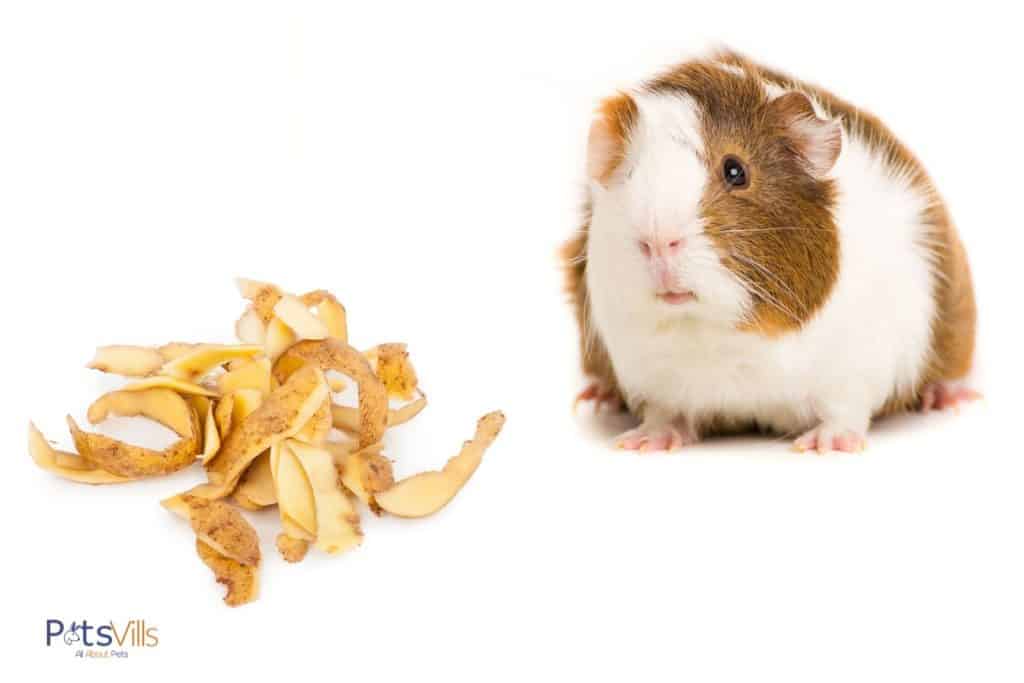
Can Guinea Pigs Eat Baked Potato?
No, baked potatoes aren’t safe either. Raw potatoes are toxic as they are.
Baking will only worsen them since they now have more sugar, more starch, and more additives.
Avoid all forms of potatoes, including foods with potato flavors.
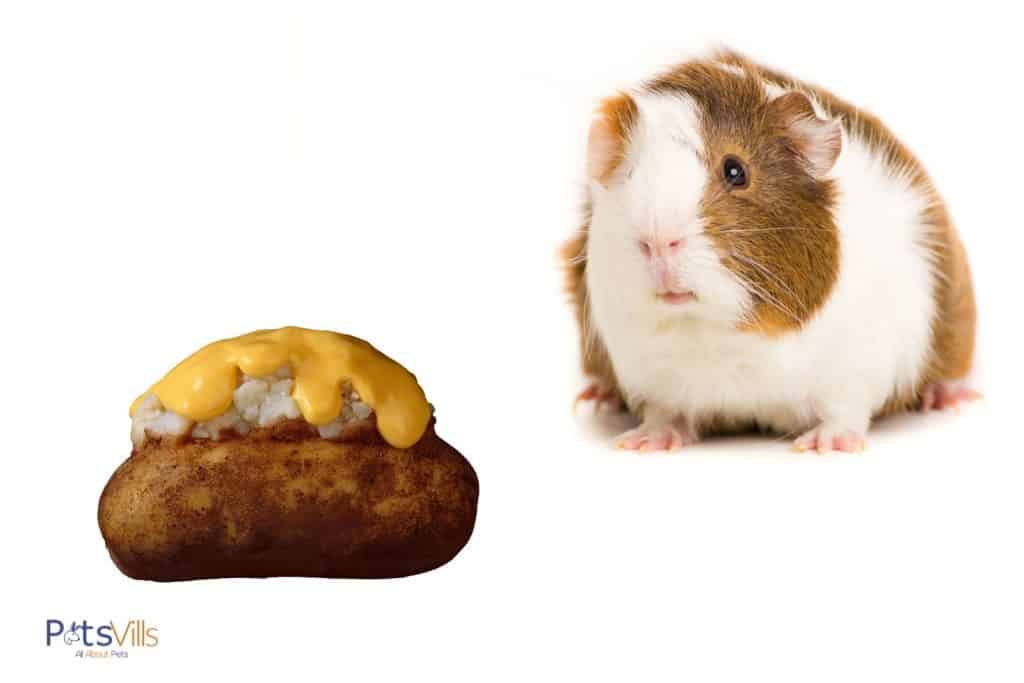
Can guinea pigs have potato sprouts?
Sprouts are those shoots that develop at the potato eyes, and they are toxic to humans, let alone guinea pigs.
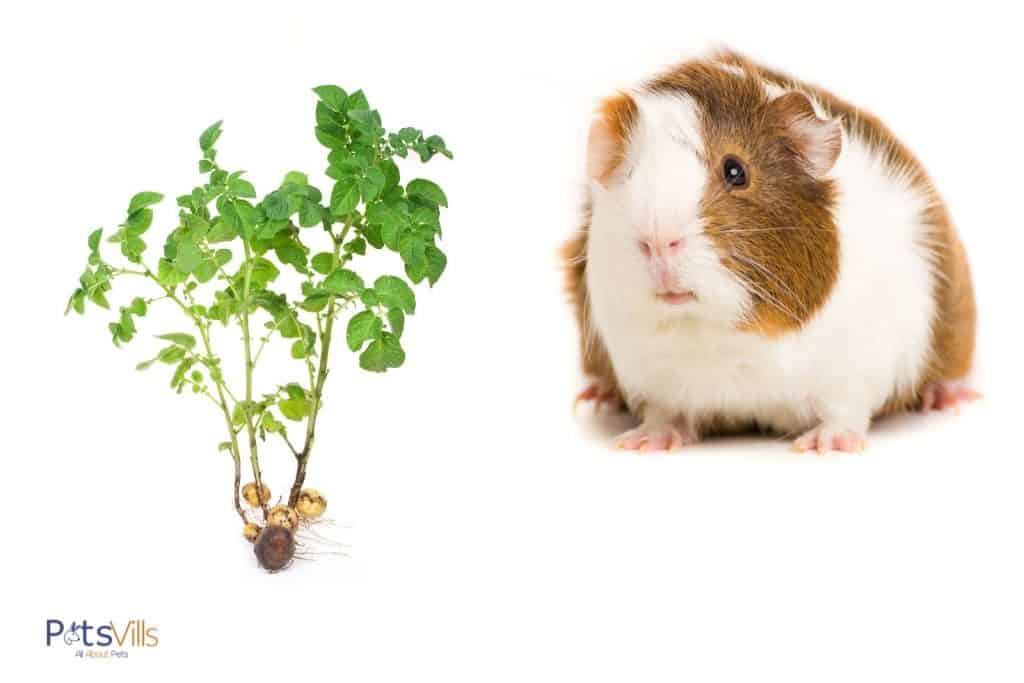
Can Guinea Pigs Have Sweet Potatoes?
Yes, you can feed guinea pigs sweet potatoes.
However, they should be fed in moderation since sweet potatoes contain too much sugar, fat, and oxalic acid.
While they share a name, potatoes and sweet potatoes belong to different genetic families.
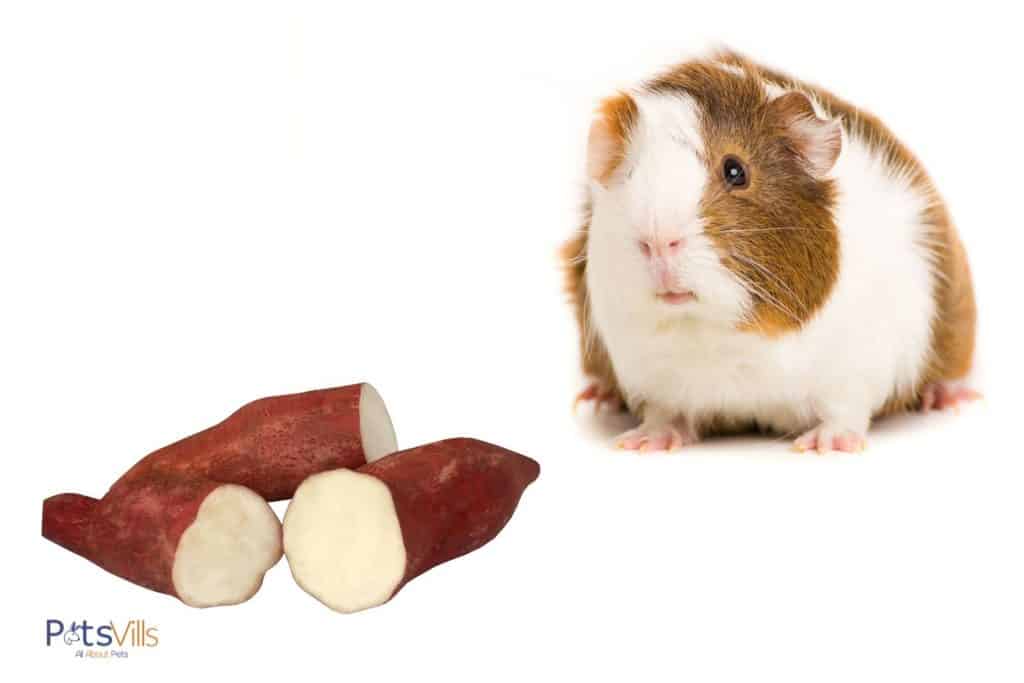
Sweet potatoes belong to the Convolvulaceae family, and they don’t contain alkaloids, solanine, or other toxins found in potatoes.
Can Guinea Pigs Eat Sweet Potato Leaves?
Yes, sweet potato leaves are safe for guinea pigs. They don’t contain solanine like in Irish potatoes.
But they aren’t that nutritious compared to veggies or hay, so feed them a few leaves a few times a week.
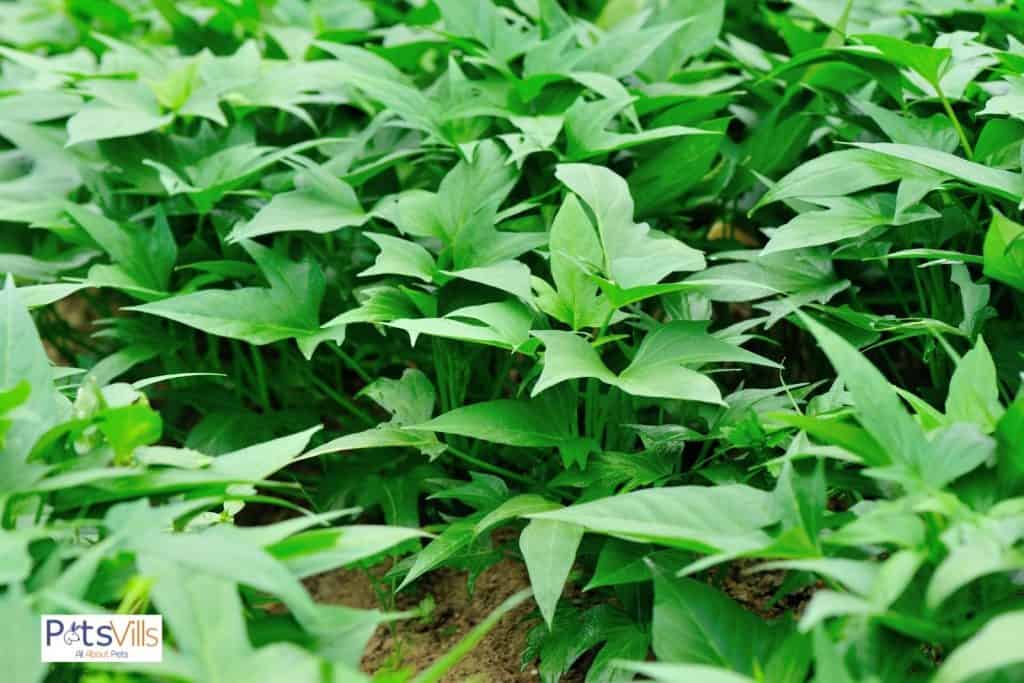
Do Guinea Pigs Like Potatoes?
Some guinea pigs may like them. Some may not. But generally, guinea pigs are curious and will nibble and chew on anything they find.
You could be peeling potatoes for dinner as your piggy gives you company, and she takes a bite.
So it’s your job as the guinea pig owner to make sure they don’t have access to any toxic foods.
Are potatoes Good For Guinea Pigs?
Potatoes aren’t all toxic and dangerous.
The fact that you would love to feed some to your guinea pigs means you enjoy cooking them, or you enjoy French fries, mashed potatoes, or any other form of potatoes.
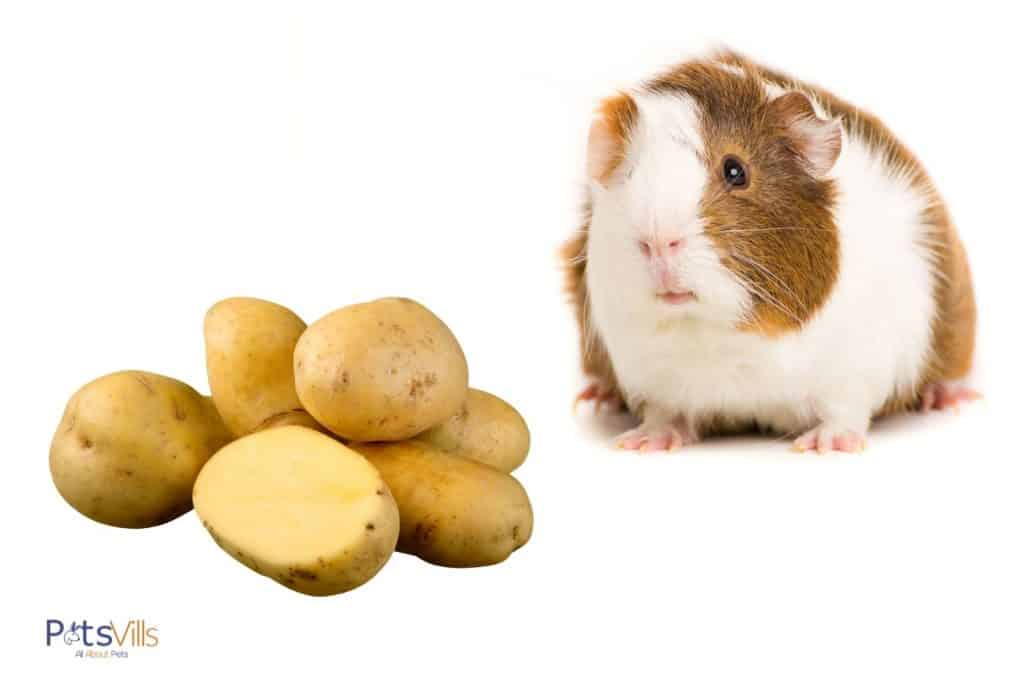
Did you also know that both guinea pigs and potatoes originated from Peru?
According to this study, they developed solanine as a defense mechanism against rodents such as guinea pigs and attack by fungi or diseases.
Are they suitable for guinea pigs? No. Due to the risks involved, it’s best to avoid them and look for healthier alternatives (I will share some shortly).
But Before I discuss these risks, let’s first review some of the nutrients potatoes contain.
Vitamin C
According to a Nutrition and Consumer Protection Division of FAO report, potatoes are very rich in Vitamin C.
Guinea pigs need Vitamin C in their diet since they can’t synthesize it. And it helps in bone formation, blood vessel integrity, and overall health.
A deficiency in this Vitamin C could lead to Scurvy, a condition characterized by joints and bone issues. Unfortunately, potatoes can’t form part of their diet.
Fiber
According to this study, potatoes are also high in dietary fiber, which helps in digestion and maintains gut health.
Fiber also helps eliminate excess cholesterol, and it helps prevent constipation.
Carbs and Starch
Carbs or starch make almost 70 percent of all dry matter that makes up potatoes.
Guinea pigs need carbs for energy, while starch is good for digestion and controlling blood sugar and insulin sensitivity.
However, potatoes contain excess starch, which isn’t suitable for guinea pigs.
Minerals
Potatoes are rich in potassium, magnesium, copper, and calcium. Potassium helps fight heart diseases and control blood pressure, calcium helps strengthen bones and teeth, and copper facilitates the formation of red blood cells.
Copper also prevents anemia and works together with Vitamin C to facilitate the absorption of iron into the guinea pig’s body.
Other Vitamins
Potatoes are also good sources of Vitamins B1 (Thiamin), B3 (Niacin), B5 (Pantothenic acid), and B6.
Vitamin B1 keeps body organs such as the heart, nerves, and digestive system healthy.
Vitamin B3 is essential in controlling cholesterol levels and arthritis pain levels. Vitamin B5 facilitates metabolism, while Vitamin B6 helps minimize body stress.
Risks OF Feeding Guinea Pigs Potatoes
Below are some of the health issues you may face once they feed on this vegetable.
- Digestive issues
- As mentioned earlier, potatoes contain too many alkaloids and solanine, which cause diarrhea, stomach upsets, and in worst-case scenarios, death.
- Alkaloids are harmful to humans too. It’s just the amounts in fresh potatoes aren’t enough to cause harm.
- According to healthline.com, you should not eat potatoes with turned green or potato sprouts because they contain concentrated amounts of these toxins.
- Complications in the urinary tract
- Calcium is essential in the formation and strengthening of bones.
- However, too much of it binds with oxalates to form kidney stones in the kidney and along the urethra.
- These stones cause severe pain, blood in urine, and inflammation, as explained by the Unusual Pet Vets.
- Rapid Weight gain
- Guinea pigs contain a lot of carbs, calories, and a considerable amount of sugar.
- These are some of the main reasons guinea pigs gain too much weight, which brings along heart diseases and other health issues.
- The sugar content in the form of fructose also causes digestive problems in guinea pigs.
- They may not have as much sugar as strawberries, but it’s still more than guinea pigs need.
What To Do If Your Guinea Pigs Eat Potatoes?
As mentioned earlier, guinea pigs will chew on anything that looks like food.
So don’t be surprised when they eat potatoes or potato peelings or any other part of potato plants. In some cases, nothing may happen.
But observe your pet for a few hours.
IF you notice lethargy, loose stool, pain, blood in their urine, or any other change in their health, make sure they get enough fresh water and contact your vet as soon as possible.
How Often Should You Feed Guinea Pigs Potatoes?
Again, never feed your guinea pigs potatoes. While they have some health benefits, they are not nutritionally suitable for guinea pigs.
Other Foods Guinea Pigs Shouldn’t Eat?
Below are more foods that are toxic to guinea pigs.
Animal Products
Guinea pigs are herbivores. They survive on foliage, leaves, and twigs when in the wild.
They’re also lactose intolerant. Therefore, animal products such as meat, milk, cream, fish, yogurt, cheese, or eggs are new to their digestive systems, and they can’t digest them.
Processed Food
Foods such as chocolate, ice cream, bread, pizza, or any canned or frozen fruit or vegetables are also harmful to guinea pigs.
Most of these foods contain animal and dairy products. Others contain salt, sugar, sodium, preservatives, and other additives that aren’t suitable for your cavies.
Rhubarb
This perennial plant with reddish stalks and green leaves is also very toxic to guinea pigs.
It contains too much calcium and oxalic acid, which, as I’ve already mentioned, are the leading causes of bladder sludge.
Rhubarbs are also rich in sugar, phosphorous, fat, salt, and acids, which don’t fare well with guinea pigs. If you have this plant o your garden, don’t let your guinea pigs graze.
Nuts and Seeds
Avoid feeding your guinea pigs any seeds or nuts since they contain too much fat, and guinea pigs can choke on the larger seeds.
Seeds are often included in pellets, so make sure the product you purchase doesn’t include them.
Rabbit food
Rabbit, or any other small pet food, isn’t suitable for guinea pigs; always look for guinea pig-specific foods. All of these pets have different dietary needs.
For instance, guinea pig foods are fortified with Vitamin C since guinea pigs can’t make their own.
But you’ll find other pet food with low amounts of Vitamin C and a high amount of another nutrient which cavies don’t may not need.
READ MORE: Can Guinea Pigs Eat Tomatoes Everyday?
What Should Guinea Pigs Eat?
Now that you know that guinea pigs shouldn’t eat potatoes, and other foods that they shouldn’t eat, let’s review what they should eat.
Hay
According to Tamara Labelle, author at EXOTICDIRECT, hay or grass should form most of the piggy’s diet.
It’s their primary source of dietary fiber, Vitamin C, proteins, minerals, and all other nutrients that they may need.
It’s also low in fat, sugar, and calories.
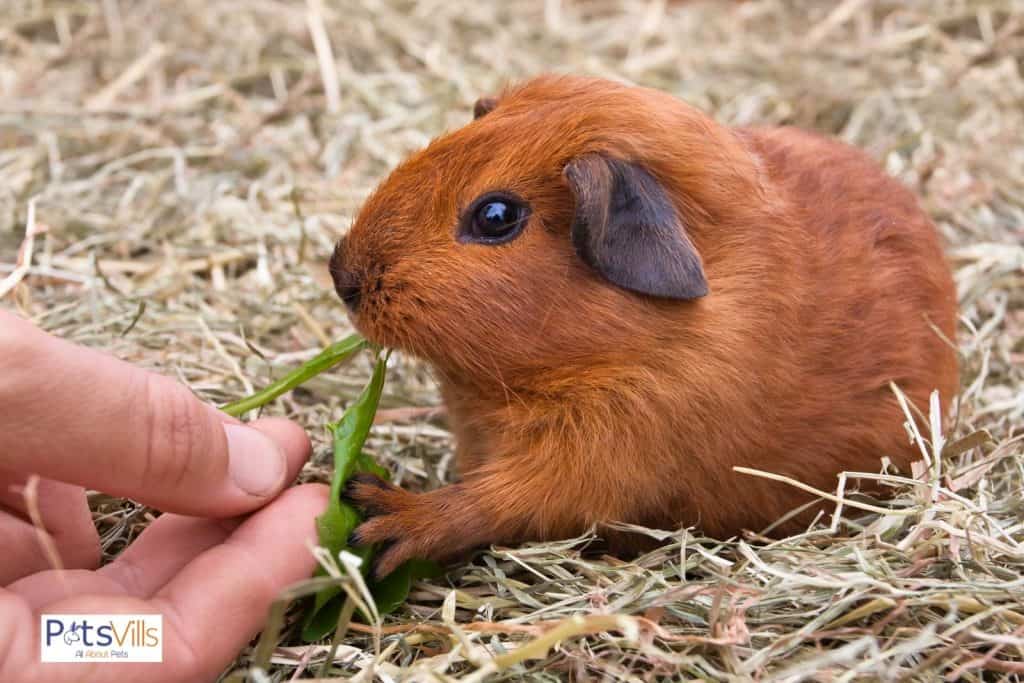
That’s why they can feed on it 24/7 without suffering from any health issues. Besides nutrients, hay also helps maintain their dental health and overall mental health.
Timothy hay is one of the best varieties to feed your cavies. Other varieties include barley, grassy, and oaten.
You should avoid alfalfa and Lucerne hay due to the high amounts of proteins and calcium.
The only exception is when dealing with underweight, pregnant, or very young piggies.
If your guinea pigs are tired of hay, you can include some corn husks, which are also excellent sources of fiber.
Commercial Food
To ensure they get enough nutrients, especially Vitamin C, the Human Society advises guinea pig owners to feed their pets at least 1/8 of a cup of Vitamin-C fortified pellets daily.
As mentioned earlier, make sure they don’t have seeds or nuts.
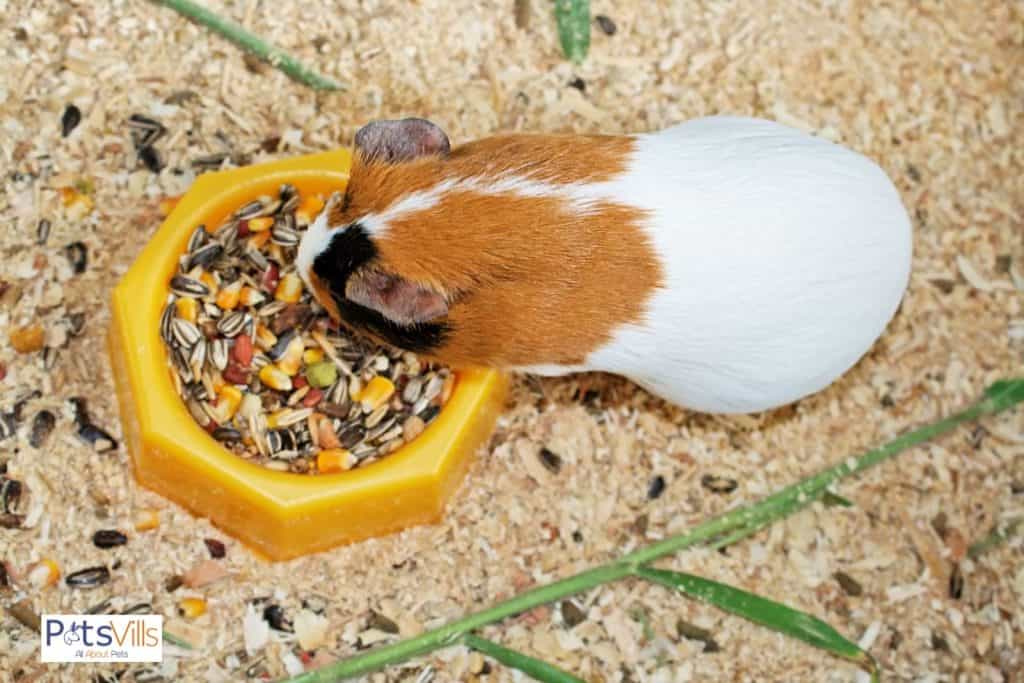
Vegetables
Tamara also notes that it’s important to include vegetables in your guinea pig’s food. According to Human Society, you should feed your guinea pigs at least one cup of vegetables and fruits daily.
This cup should include leafy greens such as romaine lettuce, a few pieces of your piggy’s favorite fruits, and other types of vegetables.
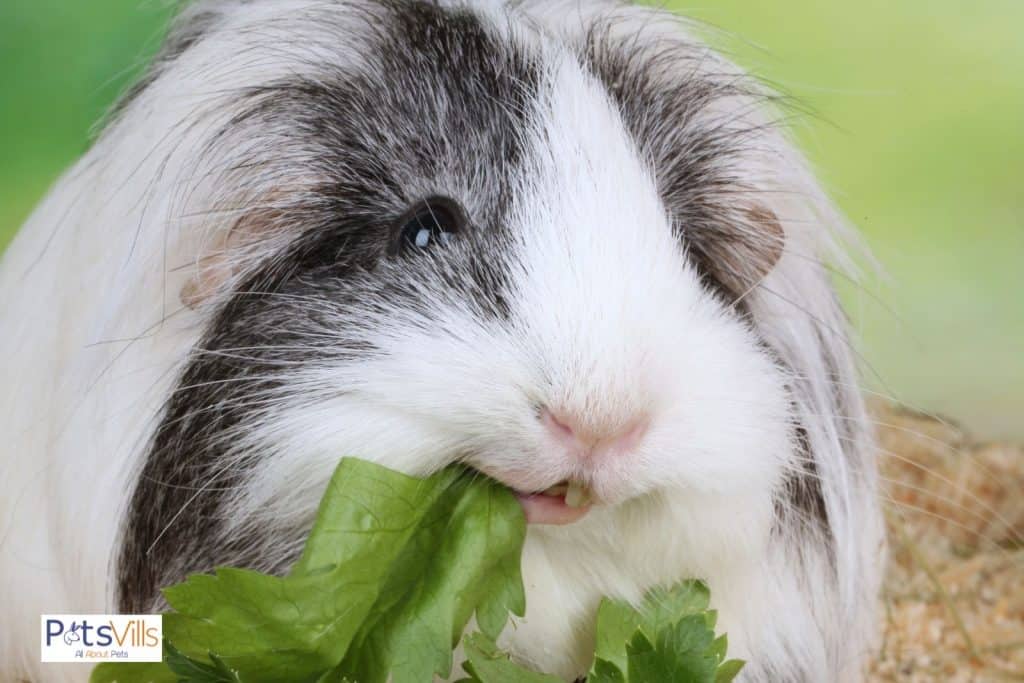
Below is a list of other vegetables you can include;
- Corn – For servings, benefits, and risks, check out this comprehensive post – Can guinea pigs eat corn?
- Asparagus
- Cilantro
- Kale
- Carrots
- Broccoli
- Parsley
- Red and green leaf lettuce
Some fruits for guinea pigs include;
- Apples
- Apricots
- Strawberries
- Blueberries
- All types of melons
- Bananas
- Papaya
- Mangoes
As mentioned earlier, always feed your guinea pigs fresh veggies and fruits. Avoid cooked forms, dried fruits, or canned forms.
Other Guinea Pig Feeding Tips
- Make sure they have a continuous supply of fresh water.
- Get rid of pellets, vegetables, and other food leftovers from the cage after 24 hours.
- When introducing a new food, start with small amounts and increase gradually.
- Seek medical advice before introducing a new food, especially if your pet is suffering from any medical condition.
Can Guinea Pigs Eat Potatoes FAQs
Can potatoes kill guinea pigs?
Yes, they can, especially those with high concentrations of alkaloids and solanine toxins.
What can kill guinea pigs?
Some highly toxic foods that could kill cavies include caffeinated products such as chocolate, plants such as avocados, Iceberg lettuce, garlic, onions, potatoes, and mushrooms.
Can Guinea Pigs Eat Yams?
Can guinea pigs eat yam? Yes, yams are safe for guinea pigs. They contain beneficial amounts of Vitamin C, antioxidants, and Vitamin K, as established by Dr. Charlotte Day. However, they have excess calories, which could lead to obesity. And they contain too much calcium, which causes kidney stones and other urinary issues. Therefore, you should feed them a few pieces of yams at least once or twice per week.
Final Thoughts
And there you have it, all forms of potatoes, including raw, cooked, baked, or mashed, are not safe for guinea pigs.
This is due to the excess starch and the presence of toxins. On the other hand, yams and sweet potatoes belong to a different genetic family.
A guinea pig’s diet should include hay, vegetables, fruits, pellets, and fresh water. Before feeding any food, check how safe it is for guinea pigs and the ideal serving size.
References
- FAO / Giulio Napolitano to increased demand for processed potatoes. 2007. “FINALE POSTER INGLESE.” http://www.fao.org/potato-2008/en/potato/IYP-6en.pdf.
- “Green Potatoes: Harmless or Poisonous?” 2017. Healthline. September 7, 2017. https://www.healthline.com/nutrition/green-potatoes#TOC_TITLE_HDR_7.
- “Guinea Pig Feeding.” 2018. The Humane Society of the United States. 2018. https://www.humanesociety.org/resources/guinea-pig-feeding.
- Haberfield, James. 2016. “Causes of Urinary Stones & Sludge in Guinea Pigs & Rabbits.” The Unusual Pet Vets. April 29, 2016. https://www.unusualpetvets.com.au/urinary-stones-sludge-rabbits-guinea-pigs/.
- “Solanine Poisoning – How Does It Happen?” n.d. MSU Extension. Accessed June 16, 2021. https://www.canr.msu.edu/news/solanine_poisoning_how_does_it_happen.
- Upilio. 2020. “Can My Guinea Pig Eat Yam?” Upilio. August 9, 2020. https://www.upilio.io/can-my-guinea-pig-eat-yam/#:~:text=Yams%20are%20rich%20in%20Vitamin.
- “What Can Guinea Pigs Eat?” n.d. Exoticdirect. https://www.exoticdirect.co.uk/news/what-can-guinea-pigs-eat-food-unsafe-food-and-dietary-requirements.
- “What Is the Difference between Sweet Potatoes and Yams?” n.d. Library of Congress, Washington, D.C. 20540 USA. Accessed June 16, 2021. https://www.loc.gov/everyday-mysteries/item/what-is-the-difference-between-sweet-potatoes-and-yams/#:~:text=The%20many%20varieties%20of%20sweet.
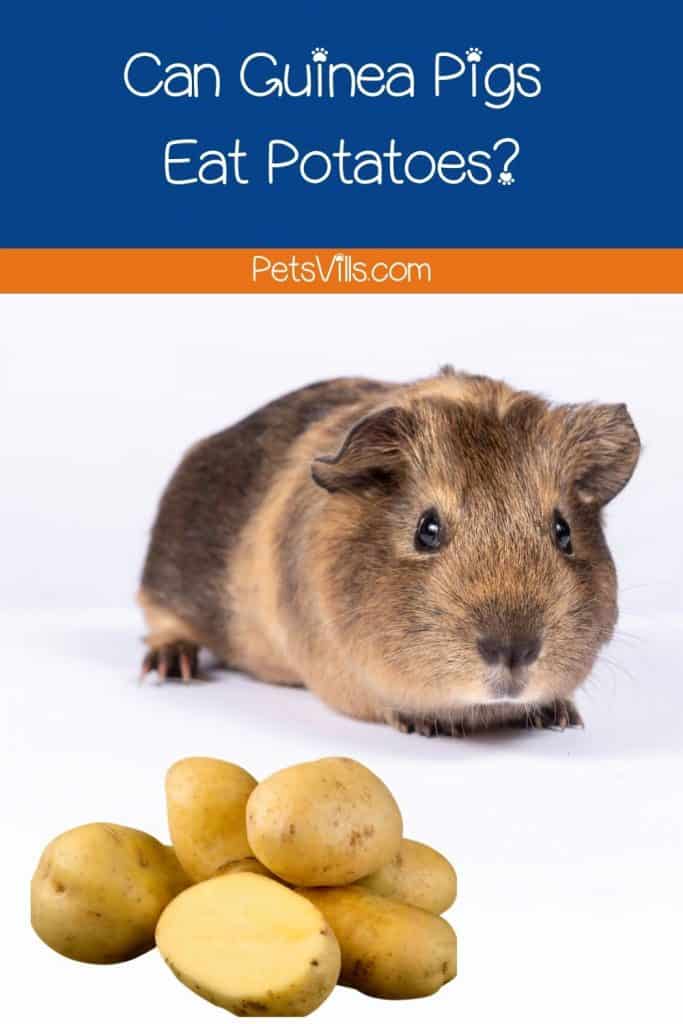
Can guinea pigs eat potatoes? What are your thoughts about it? Share with us!
Barry Stingmore is a British content writer living in Fuerteventura, Spain. An animal lover at heart, he shares his home with a dog and four rescue cats and has a passion for writing about animals big and small.
Barry loves finding answers to your animal-related questions, the more research involved the better! You can rely on him to find the facts.
Find him on FACEBOOK, TWITTER AND Linkedin
Read his latest ARTICLES.
Find more about him HERE.

